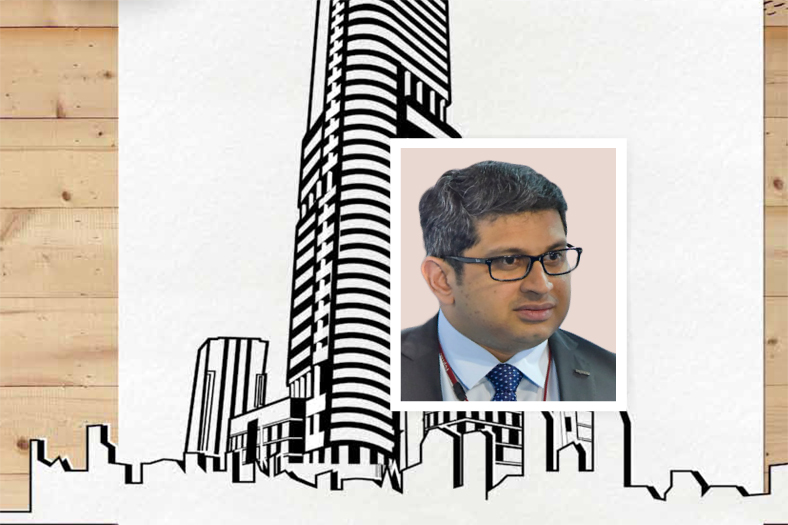Retail Sector Offers Big to Real Estate [Feb 2012]
“If FDI in retail does get approved, new retailers will be encouraged to enter the country and more local brands will emerge”, feels Jateen Gupta, MD of JP Iscon
The real estate market can be broadly divided into residential and commercial developments, with the residential segment making up most of the Indian real estate industry. The growth in this segment is primarily driven by increasing urbanisation, rise in the number of white-collar professionals and rising incomes, etc.
The commercial real estate segment, consisting primarily of office space, is growing in tandem with the country’s booming economy. The demand for office space is driven by the entry of multinational companies and growth in the service sector. Overall, across India, the demand for office space is expected to reach a total of 180 million sq. ft. by 2013.
Albeit the retail real estate segment constitutes the smallest part in the real estate industry, it is growing rapidly. The demand for good quality mall space is fuelled by the growth in organised retail and the entry of international retailers into India. Over the past few years, retail has developed into one of the fastest growing industries in the country.
Trends in the retail real estate segmentMany of the recent commercial real estate ventures include mixed-use realty that entail business, entertainment and hospitality projects, and are shaping up to become one of the hottest types of real estate in the coming financial year.
Commercial space, in India, this year has seen quite a lot of activity, with 17.5 million sq. ft. of commercial area occupied this year as compared to 15 million sq. ft. occupied in 2010. A trend that has been noticed when it comes to retail spaces is that more and more developers are willing to work on a ‘revenue sharing model’ as against only ‘pure rental model’ which is heartening to see as it is a win-win situation both for developers as well as retailers.
Developers now understand that the retail business needs a different approach as compared to the residential or office segment; it requires a more strategic long-term approach and proactive management. Malls nowadays are being developed along international standards.
Competition today has become extremely intense, there does not seem to be any respite in the near future. This has led to developers thinking out-of-the-box so as to distinguish themselves from the competition. Specialised malls are an emerging trend in the retail real estate segment at the moment. Following this trend, Gurgaon will soon have an auto mall, while Bangalore is about to get an exclusive furniture mall as well.
Looking at the current market situation, and focusing on innovativeness, JP Iscon is constructing a three-storeyed ‘medical plaza’ in the town of Deesa, in North Gujarat. The medical mall, ‘Iscon Pride’ is one of India’s first dedicated medical plazas’ and is scheduled to open next year. It will offer a wide range of healthcare facilities under one roof. Space in the medical mall shall be sold to doctors, chemists, and pathological and diagnostic laboratories, clinics and others working in the hospital and medical sectors.
Another trend is noticed in the commercial real-estate industry is that there is more of a focus on branding. The marketing of malls as products that can provide experiences and maintain customer loyalty is becoming increasingly important.
One of the very noticeable trends in the Indian real estate sector include geographic de-concentration of real estate activity from large metros, such as Bangalore, Mumbai and Delhi, to Tier II and Tier III cities (such as Ahmedabad, Chandigarh, Pune, Jaipur, Kochi, etc.).
Key Growth DriversIndia is one of the top retail destinations across the globe. Increasing disposable incomes, rising consumption and shopping convenience, as well as the development of the special economic zones as real estate property have been driving the growth of organised retail in the country. The retail industry is expected to reach USD 637 billion by 2015, with organised retail accounting for a 14 per cent to 18 per cent share.
The Indian consumers today are exposed to international brands and are becoming increasingly conscious of what they want – the advent of FDI in retail will also prove to be a boost to the sector.
FDI in Retail: A boon or a bane for commercial real estate?Indian consumers want choice today. There is a noticeable trend of consumers flocking to neighbourhood supermarkets that offer them multiple choices in different price brackets. The decision of allowing 51 per cent FDI in multi-brand retail was a historic day for Indian retail.
The organised retail market is still in its infancy and requires a long way to go. The rollback of FDI in retail has proved to be a dampener. One of the many challenges this industry faces is the real estate FDI policy which restricts what foreign investors can invest in. If FDI in retail does get approved, which is what we hope for, new retailers will be encouraged to enter the country and more local brands will emerge. It will prove to be a catalyst for the retail industry in our country.
Many different points of view regarding FDI in retail is heard – some positive, some negative. Of course, there will be increased competition, but competition is what drives one to reach for the stars. India is a huge country and there is ample space for all, irrespective whether an international brand or a local grocery store. India is in dire need of domestic as well as foreign capital to build the country’s infrastructure space. The massive employment opportunities, benefits to farmers in terms of better prices for their produce and lesser wastage, are some opportunities that FDI in retail would have created, which cannot be overlooked. There is still hope that this progressive step shall be taken.
Gujarat – The Emerging Destination for RetailGujarat has been growing at a blazing pace under stable and supportive governments for the past several years. From real estate and automobiles to infrastructure activities galore, the state promises a practical option for investors and developers in the country and aboard. The state government has always been positive in developing, discussing and framing new government policies related to real estate sector.
Statistics have shown that Gujarat, The New Detroit of India, where entrepreneurial skills run in the veins of people — is where the ‘India Shining’ story is really unfolding. With the recent influx of investments in industry, urban areas of Gujarat are also seeing a subsequent rise in infrastructure and development. Cities such as Ahmedabad are witnessing massive growth in the real estate sector.
The seventh largest city of India, Ahmedabad has a population of about half a billion and stands 2nd in the real estate sector. The well organised Municipal Corporation, better sanitary conditions, electricity & water supply, efficient transportation system have provided a suitable background for the realty sector in this city. An astonishing 40 per cent of the realty market share in Gujarat belongs to Ahmedabad.
JP Iscon has developed several commercial retail properties over Gujarat in the cities of Ahmedabad, Rajkot and Surat. Iscon Mega Mall; spread over 4.5 lakh area of retail space in Ahmedabad records an average foot-fall of around 60,000 on weekends and about 20,000 during week days. The brand conscious youth of Ahmedabad have no inhibition when it comes to splurging on what they like. They are the main customer group of the mall.
Iscon Mega Mall has emerged as the preferred destination for international and national premium high-end brands like Tommy Hilfiger, Esprit, US Polo, Guess, The Body Shop and Ritu Kumar, amongst many others. In fact, the Tommy Hilfiger store at the Mall is one of the top 3 out of about 50 such stores spread across the whole of India in terms of sales per square feet per month. The Mall also features India’s first Reliance Mart which occupies 1.8 lakh square feet of the mall area.
Cookie Consent
We use cookies to personalize your experience. By continuing to visit this website you agree to our Terms & Conditions, Privacy Policy and Cookie Policy.









